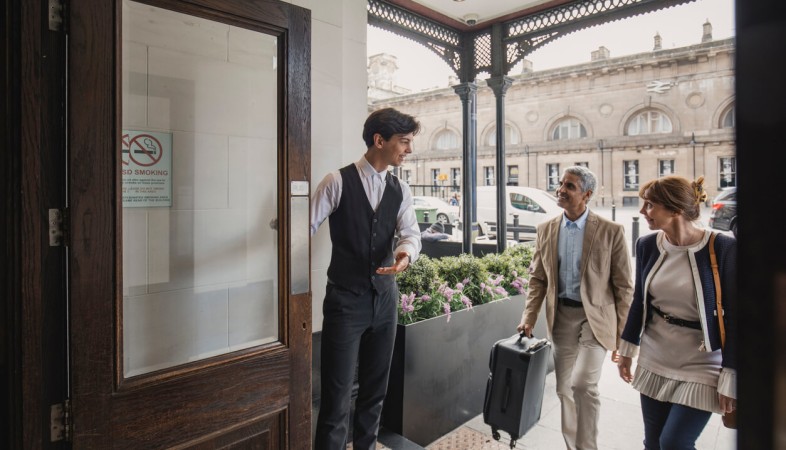Hotel Security Measures: Ensuring Guest Safety
Hotels must balance accessibility and convenience with robust security protocols to protect guests, staff, and property.

In the hospitality industry, guest safety is paramount, and
implementing effective security measures is essential for ensuring a secure and
welcoming environment. Hotels must balance accessibility and convenience with
robust security protocols to protect guests, staff, and property. A
comprehensive approach to hotel security encompasses physical security
measures, technological advancements, staff training, and emergency
preparedness.
Physical security measures form the foundation of a hotel’s safety strategy. The design and layout of the hotel can significantly impact security. Controlled access points, such as key card-operated doors and secure entryways, help restrict unauthorized access to guest areas. Surveillance cameras strategically placed in common areas, entrances, and corridors provide continuous monitoring and act as a deterrent to potential intruders. Visible security personnel in lobbies and other public spaces enhance the sense of safety and can quickly respond to incidents.
Room security is another critical aspect. Modern hotels typically use electronic key cards, which are more secure than traditional keys. These systems can be easily deactivated if lost or stolen, reducing the risk of unauthorized room access. In-room safes provide guests with a secure place to store valuables. Additionally, implementing measures such as peepholes and deadbolt locks on guest room doors further enhances personal safety.
Technological advancements have revolutionized hotel security. Advanced surveillance systems with high-definition cameras and facial recognition software enhance monitoring capabilities. These systems can alert security personnel to suspicious activities in real time, allowing for prompt action. Access control systems, which use biometric authentication or mobile key technology, provide an additional layer of security, ensuring that only authorized individuals can enter restricted areas.
Cybersecurity is increasingly important in an era where digital transactions and data storage are prevalent. Hotels must protect guests’ personal and financial information from cyber threats. Implementing secure Wi-Fi networks, encrypting data, and regularly updating security software are essential practices. Training staff to recognize phishing attempts and other cyber threats further bolsters cybersecurity efforts.
Staff training is a vital component of hotel security. Employees should be trained to recognize and respond to potential security threats. Regular drills and training sessions on emergency procedures, such as fire evacuation, handling suspicious packages, and responding to medical emergencies, prepare staff to act swiftly and effectively. Front desk personnel should be trained to verify guest identities during check-in and be vigilant for any unusual behavior.
Collaboration with local law enforcement and emergency services enhances a hotel’s security framework. Establishing relationships with local authorities ensures a coordinated response in case of emergencies. Regular security audits and assessments by external experts can identify vulnerabilities and recommend improvements.
Emergency preparedness is crucial for guest safety. Hotels should have clear, well-communicated emergency plans for various scenarios, including fires, natural disasters, medical emergencies, and security threats. Evacuation routes and procedures should be prominently displayed in guest rooms and common areas. Regularly testing fire alarms, sprinkler systems, and emergency lighting ensures these systems function correctly in an emergency. Providing guests with information on emergency procedures during check-in can also improve preparedness.
Creating a culture of security within the hotel is essential. Encouraging guests to be aware of their surroundings and report suspicious activities contributes to a safer environment. Providing guests with safety tips, such as using hotel safes, locking doors, and not sharing room numbers with strangers, empowers them to take an active role in their security.
Hotel security measures are multifaceted and must be continually evaluated and updated to address evolving threats. A comprehensive security strategy that includes physical security, technological advancements, staff training, and emergency preparedness is essential for ensuring guest safety. By prioritizing security and creating a culture of vigilance, hotels can provide a safe and secure environment that enhances the guest experience and builds trust and loyalty.
.png)













.jpg)














